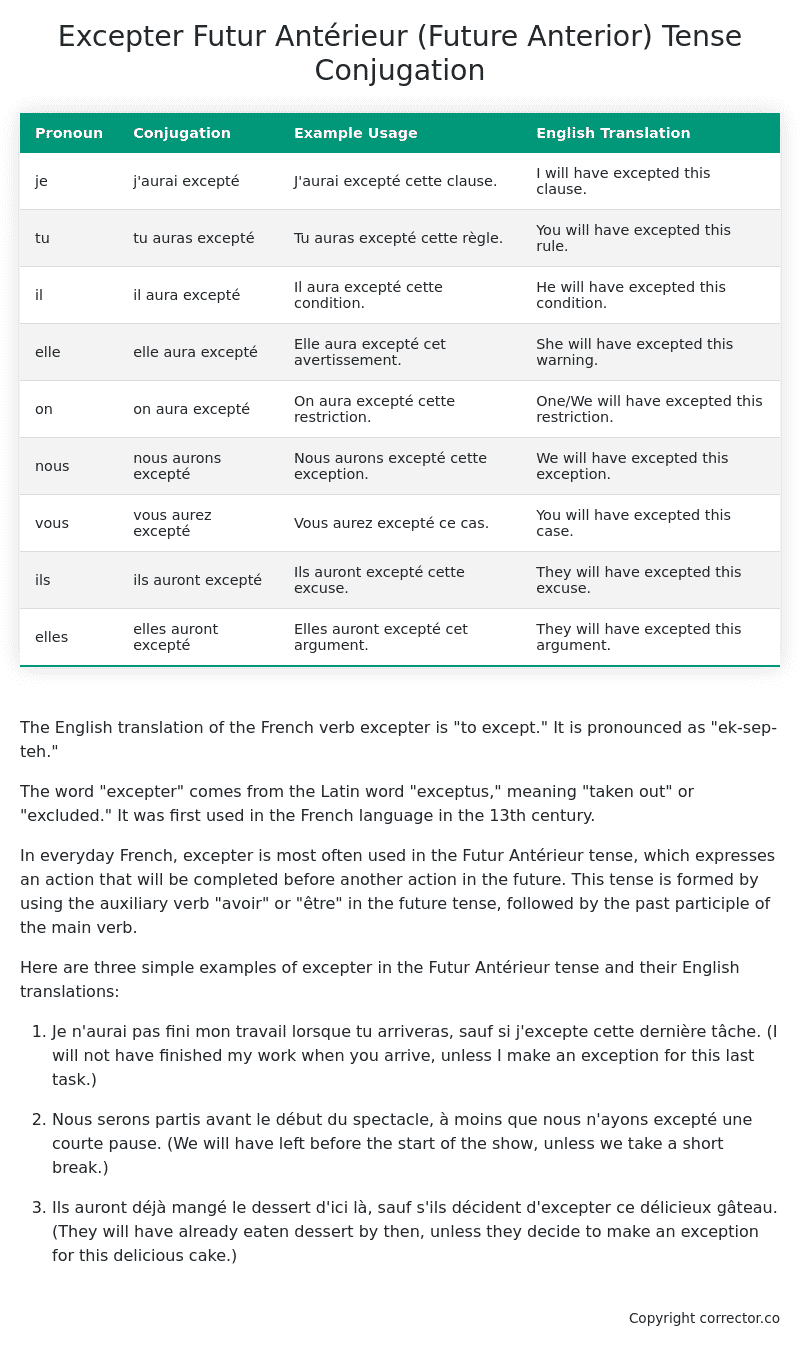Futur Antérieur (Future Anterior) Tense Conjugation of the French Verb excepter
Introduction to the verb excepter
The English translation of the French verb excepter is “to except.” It is pronounced as “ek-sep-teh.”
The word “excepter” comes from the Latin word “exceptus,” meaning “taken out” or “excluded.” It was first used in the French language in the 13th century.
In everyday French, excepter is most often used in the Futur Antérieur tense, which expresses an action that will be completed before another action in the future. This tense is formed by using the auxiliary verb “avoir” or “être” in the future tense, followed by the past participle of the main verb.
Here are three simple examples of excepter in the Futur Antérieur tense and their English translations:
-
Je n’aurai pas fini mon travail lorsque tu arriveras, sauf si j’excepte cette dernière tâche. (I will not have finished my work when you arrive, unless I make an exception for this last task.)
-
Nous serons partis avant le début du spectacle, à moins que nous n’ayons excepté une courte pause. (We will have left before the start of the show, unless we take a short break.)
-
Ils auront déjà mangé le dessert d’ici là, sauf s’ils décident d’excepter ce délicieux gâteau. (They will have already eaten dessert by then, unless they decide to make an exception for this delicious cake.)
Table of the Futur Antérieur (Future Anterior) Tense Conjugation of excepter
| Pronoun | Conjugation | Example Usage | English Translation |
|---|---|---|---|
| je | j’aurai excepté | J’aurai excepté cette clause. | I will have excepted this clause. |
| tu | tu auras excepté | Tu auras excepté cette règle. | You will have excepted this rule. |
| il | il aura excepté | Il aura excepté cette condition. | He will have excepted this condition. |
| elle | elle aura excepté | Elle aura excepté cet avertissement. | She will have excepted this warning. |
| on | on aura excepté | On aura excepté cette restriction. | One/We will have excepted this restriction. |
| nous | nous aurons excepté | Nous aurons excepté cette exception. | We will have excepted this exception. |
| vous | vous aurez excepté | Vous aurez excepté ce cas. | You will have excepted this case. |
| ils | ils auront excepté | Ils auront excepté cette excuse. | They will have excepted this excuse. |
| elles | elles auront excepté | Elles auront excepté cet argument. | They will have excepted this argument. |
Other Conjugations for Excepter.
Le Present (Present Tense) Conjugation of the French Verb excepter
Imparfait (Imperfect) Tense Conjugation of the French Verb excepter
Passé Simple (Simple Past) Tense Conjugation of the French Verb excepter
Passé Composé (Present Perfect) Tense Conjugation of the French Verb excepter
Futur Simple (Simple Future) Tense Conjugation of the French Verb excepter
Futur Proche (Near Future) Tense Conjugation of the French Verb excepter
Plus-que-parfait (Pluperfect) Tense Conjugation of the French Verb excepter
Passé Antérieur (Past Anterior) Tense Conjugation of the French Verb excepter
Futur Antérieur (Future Anterior) Tense Conjugation of the French Verb excepter (this article)
Subjonctif Présent (Subjunctive Present) Tense Conjugation of the French Verb excepter
Subjonctif Passé (Subjunctive Past) Tense Conjugation of the French Verb excepter
Subjonctif Imparfait (Subjunctive Imperfect) Tense Conjugation of the French Verb excepter
Subjonctif Plus-que-parfait (Subjunctive Pluperfect) Tense Conjugation of the French Verb excepter
Conditionnel Présent (Conditional Present) Tense Conjugation of the French Verb excepter
Conditionnel Passé (Conditional Past) Tense Conjugation of the French Verb excepter
L’impératif Présent (Imperative Present) Tense Conjugation of the French Verb excepter
L’infinitif Présent (Infinitive Present) Tense Conjugation of the French Verb excepter
Struggling with French verbs or the language in general? Why not use our free French Grammar Checker – no registration required!
Get a FREE Download Study Sheet of this Conjugation 🔥
Simply right click the image below, click “save image” and get your free reference for the excepter Futur Antérieur tense conjugation!

Excepter – About the French Futur Antérieur (Future Anterior) Tense
Construction
Common Everyday Usage Patterns
Interactions with Other Tenses
For example
Summary
I hope you enjoyed this article on the verb excepter. Still in a learning mood? Check out another TOTALLY random French verb conjugation!


